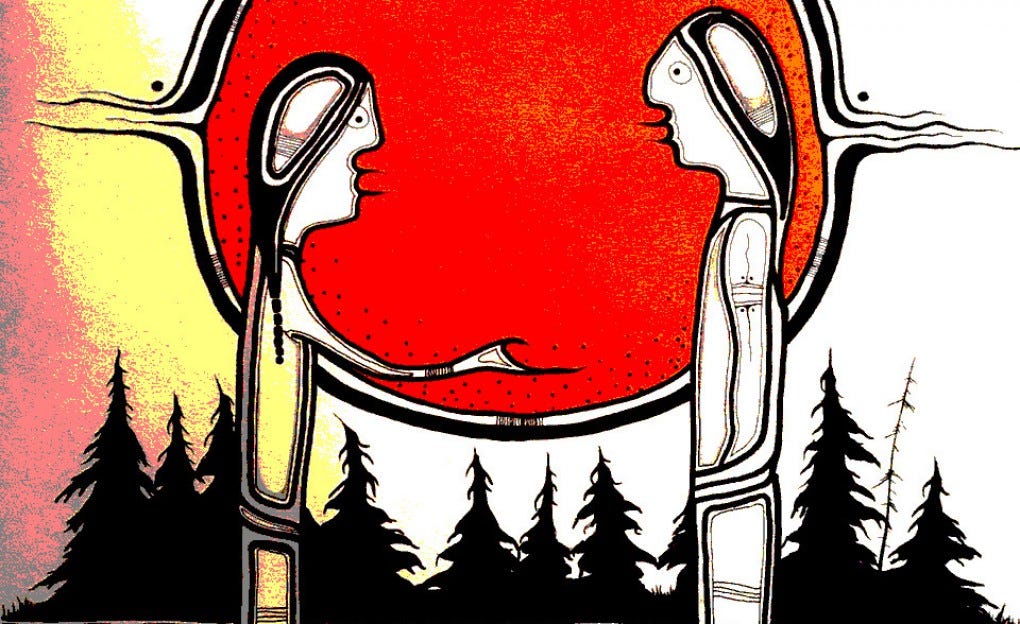Reconsidering Reconciliation: Weighing Canada's successes and failures
Can the Truth & Reconciliation narrative be rescued?
By
Truth and Reconciliation in Canada has some major flaws, not least is the acute lack of truthfulness and transparency that we see today. This flawed process cannot possibly lead to anything even remotely resembling a fair and honest reconciliation. On the contrary, this uniquely dysfunctional circumstance is leading to an irreconcilable rift in indigenous-non-indigenous relations.
It is evident that we cannot agree on what happened in the past, nor can we agree on what is happening in the present. The past is said to be characterized by oppression, stolen land, and genocide, while the present, is often referred to as “on-going genocide,” but is said to be about truth, reconciliation, and progress, all according to how these concepts have been redefined under the ideological framework of Social Justice philosophy.
Very much a product of our times, this Truth and Reconciliation process is obscenely skewed towards the world of narrative, and equally skewed away from the world of facts and substantiation. Reconsidering reconciliation in the Canadian context is as simple as examining it by objective and empirical methods, something that many Canadian academics and independent researchers have been doing for years while mostly ignored by the pusillanimous legacy media class.
However, every day more Canadians are challenging the assumptions of the Truth and Reconciliation Commission, and the claims of the media concerning missing and/or murdered former residential school students, said to be discovered in unmarked graves across the country.
This pushback is a recent phenomenon that is largely due to the efforts of a small group of academics and researchers. What is deeply concerning, is that the Social Justice activists who push false narratives - in this case activists of the “Aboriginal Industry” - have launched a smear campaign against journalists, researchers, academics and other Canadians who question any part of its narrative, no matter how implausible. They are being labeled as “denialists,” somewhat similar to Holocaust denialists.
The activists’ influence on our governments and media is so overwhelming that their recent calls to criminalize “residential school denialism” are being taken seriously by those at the highest offices in the nation.
This means that there is a need for outspoken contrarians with facts, evidence, and philosophically sound argumentation. Independent researchers, like Nina Green, for example, who publishes her findings on a website of Indian Residential School records. But also, those who have looked objectively at the historical record concerning Canadian colonialism, treaties with the Indigenous people, the Indian Act, and the legacy of Indian Residential Schools remain the last hope of restoring credibility to Canada’s gravely damaged reputation.
The so-called “denialists” are not, in fact, denying anything, but are actually historians, political scientists, sociologists, and anthropologists who have noticed the astonishing lack of evidence that is needed to corroborate the activist narrative. However, where there is empirical evidence, a narrative is revealed that is very much unlike the one presented by the Aboriginal Industry.
The easiest Aboriginal Industry claim to shoot down, and it is a claim that is made often in a variety of ways, is that there was intent to kill off the indigenous children in residential schools. Which leads to things like, “No Pride In Genocide” - a popular meme that was circulating on social media this past Canada day.
But once the historical record is properly weighed, there can be no denying that since the time of contact the general policy of settlers concerning natives was one of cooperation and accomodation. To see this, we need to look no further than the mutually beneficial fur trade, the numbered treaties, the life-saving food rations, the vaccination programs, and the decades-long reserve system with their financial dependance on Canadian taxpayers, and the Herculean efforts toward education and enculturation of indigenous people into modern Western lifeways, to get a clear picture of what Canada’s intentions were.
In my view, reconsidering reconciliation, if done meaningfully, should pay no attention to aspersions of denialism. No pejoratives, no matter how damaging and stigmatizing they are should prevent Canadians from knowing the full truth about their country. Especially when one considers that the lies being pushed by the Aboriginal Industry are directly connected to a vast decades long compensation pipeline that flows from the purses and pockets of Canadian taxpayers to the greedy hands of indigenous neo-tribal elites and their non-indigenous cronies, who do little if anything for the suffering indigenous underclass.
Indigenous grievance activism is a lucrative international grift. The Aboriginal Industry of Canada, who strongly support implementation of the United Nations Declaration on the Rights of Indigenous Peoples (UNDRIP), has seized an unprecedented amount of power and influence over government policy and media coverage. Reconsidering reconciliation, if done meaningfully, however, has the potential to hit the reset button to the betterment of all Canadians.
There seems to be an aspect of Main Character Syndrome encouraged through the patronization of Canada’s Truth and Reconciliation exercise. However, the truth is that at the time of contact, there were roughly 200,000 Indigenous people in small kinship bands of hunter-gatherer/trapper/horticulturalist dispersed across the enormous landmass. And today that number remains at 1.2 million - a small percentage of the Canadian population.
While we honour the indigenous peoples as the first occupants of this country, and their tribal histories deserve to be preserved, respected, and studied, the story of modern Canada is one of exploration and innovation largely by European immigrants. And not only that, but their story is very much about being helped by Europeans. With the narrative framed this way, Canadians can empathize with the challenges faced by the sudden cultural advancement that contact entailed for Indigenous people.
There is no example of any human population who smoothly and successfully leap-frogged into the modern world without suffering. However, today many indigenous Canadians have found success in no small part due to their Western education, and are the world's best examples of peoples who have defied the odds and successfully made this gigantic leap.
In the same way that the success of indigenous people who attended residential schools are given little attention in the legacy media. We must reconsider Canada because it must be rescued from the false and ugly stories that so slander her history and cultural heritage. We must reject the denialism of those who want to destroy the country, and we must reconsider reconciliation as balancing Canada’s successes with her failures. If done well, indigenous relations with European settlers will be seen as a net benefit for indigenous and non-indigenous alike. The intent was cooperation and development, the process was, of course, imperfect, but the net result was an overwhelming benefit for us all. That is the truth of our shared Canadian story.
___
Thanks for reading. For more from this author read The Long Telegram
There are now two ways to support Woke Watch Canada through donations:
1) By subscribing to the paid version of the Woke Watch Canada Newsletter for - $5 USD/month or $50 USD/year
2) By making a contribution to the Investigating Wokeism In Canada Initiative, which raises the funds necessary to maintain and expand Woke Watch Canada’s research and investigation into Canadian Education, Indigenous Issues, Free Speech, and other areas of Leftist Illiberal Subversion and the Canadian Culture Wars.






James, this is excellent. I fully support what you say. This subject is not my professional or personal area of expertise, but even as a casual observer and critical thinker I know what you say to be true. When the first T&R project was set up in SA by Desmond Tutu, I recall it being a success, and it was driven by core Christian values of atonement, grace, and forgiveness. This one in Canada is headed the other way, descending into anger, blame and desire for revenge.
I spent my career as a teacher, and over the last 10-15 years there emerged a taboo against saying what James Pew writes: “The intent was cooperation and development, the process was, of course, imperfect, but the net result was an overwhelming benefit for us all.” There was immediate backlash against any teacher who spoke of positive intent, and the one Canadian politician who did, Senator Lynn Beyak, was denigrated and forced into retirement. I am with James and the diehard commentators above. I seek an honest account of history, not falsehoods, false testimony against priests, or false tears over false graves and false reports of murder.